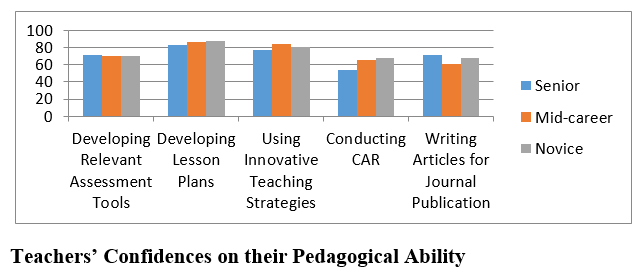Professional identity construction of EFL teachers as autonomous learners
DOI:
https://doi.org/10.21070/jees.v6i2.1646Keywords:
professional identity, EFL teachers, autonomous learnersAbstract
Teacher Professional Development (TPD) is exponential for English teachers to the success of teaching and learning process in the classroom. Teachers with professional identity are deemed to have good quality in teaching. As stipulated by Rodgers & Scott (2008) teachers with professional identity are deemed to have good quality in teaching. The efforts to do this can be accomplished through such ways as participating in conferences, seminars, workshops, and non-degree training, or even pursuing their further studies to master’ s degree and doctorate program. Also, they can conduct research and publish articles. This article is intended to provide evidence how novice, mid-career, and senior EFL teachers construct their identity professionally and autonomously. To arrive at the purpose of the study, an explorative survey was carried out to 129 EFL teachers throughout the Province of East Java via online questionnaire with 37 close-ended items. The findings revealed that (1) EFL teachers, be they junior, mid-career or senior ones involved in the present study, have tried to professionalize themselves via a number of corridors from self-directed ones to the ones imposed by other professional development providers; (2) teachers perceive their professional status and areas in diverse ways, and (3) they have various professional and pedagogical knowledge and skills related to becoming professional EFL teachers. In conclusion, EFL novice, mid-career or senior teachers have manifested their professional identity with a number of corridors as professional autonomous learners.
HIGHLIGHTS :
- Most teachers, especially in the senior and mid-career groups, are committed to improving their English skills.
- Teachers tend to be more interested in taking part in workshops on ICT-based teaching compared to other themes.
- Teachers tend to have quite high self-perceptions regarding their level of professionalism, although there is variation between seniority groups.
Downloads
References
Alghamdi, A.K.H. & Sihes, A.J. (2015). Effect of Professional Development on Classroom Practices in Some Selected Saudi Universities. International Journal of Higher Education Vol. 5, No. 1; 2016, 152-159.
Australia Institute for Teaching and chool Leadership/AITSL. (2011). Professional Standards for Teachers. Melbourne: Author. Available from http://www.aitsl.edu.au/australian-professional-standards for teachers (accessed on March 25, 2019).
Beijaard, D.; Meijer, P. C. & Verloop, N. (2004). Reconsidering research on teachers professional identity. Teaching and Teacher Education, 20, 2, pp. 107-128.
Davidson, G., Dunlop, F., Soriano, D. H., Kennedy, L., & Phillips, T. (2012). Goingforward: continuing professional eevelopment for English language teachers in the UK. UK: British Council.
Department of Education. (2011). Teachers’ Standards. London: Author. Available from http://www.gov.uk//government/publications/teachers-standards (accessed on March 25, 2019)
Fox, N. (2006). Using Interviews in a Research Project. The NIHR RDS for the East Mid- careerlands / Yorkshire & the Humber.
Hilton, G., Flores,M.A., & Niklasson, L. (2013). Teacher quality, professionalism and professional development: findings from a European project, Teacher Development, 17:4, 431-447, DOI: 10.1080/13664530.2013.800743
Guskey, T.R. (2003). What makes professional development effective? Phi Delta Kappan, 84 (10), 748-750.
Ivanova, I & Skara, R. M. (2016). Procedia - Social and Behavioral Sciences (232): 529 – 536
Joseph, D., & Heading, M. (2010). Putting theory into practice: moving from student identity to teacher identity. Australian Journal of Teacher Education, 35(3), 75- 87.
Kekana, M. & Gaigher, E. (2018). Understanding Science Teachers‟ Classroom Practice after Completing a Professional-development Programme: A Case Study. Eurasia Journal of Math., Sci Tech. Ed. Vol. 14(8):em1561. doi: https://doi.org/10.29333/ejmste/91831
Lace, I. (2014). Pedagoaiskais pašvartajums topoša skolotaja karejeras attastaba. Promocijas darbs. Liepaja: LiepU
Piedrahíta, A.M.S. (2018). Changing Teaching Practices: The Impact of a Professional Development Program on an English Language Teacher. Íkala vol.23 no.1 . ttp://dx.doi.org/10.17533/udea.ikala.v23n01a08
Rodgers, C. R.; Scott, K. H. (2008). The development of the personal self and professional identity in learning to teach. In: Cochran-Smith, M.; Feiman-Nemser, S.; Mc Intyre, D.J. (Eds.) and Demersd, K. E. (as. Ed.). 2008. Handbook of Research on Teacher Education. New York and London: Routledge and the Association of Teacher Educators, 3rd Edition.
Sparks, P., & Shepherd, R. (1992). Self-identity and the theory of planned behavior: Assessing the role of identification with "Green Consumerism" Social Psychology Quarterly, 55(4), 388-399.
Stets, J., & Burke, P. (2000). Identity theory and social identity theory. Social Psychology Quarterly, 63(3), 224-237.
Teaching Council. (2012). Code of Professional Conduct for Teachers. Maynooth: Ireland. Available from http://www.teaching-council.ie/professional -standards/code-of- professional-conduct-for-teachers.1425.html (accessed on March 25, 2019)
Tichenor, M.S. & Tichenor, J.M. (2005). Understanding Teachers‟ Perspectives on Professionalism The Professional Educators, Volume XXVII, Number 1 & 2, Fall 2004 & Spring 2005, 89-95.
Van der Klink, M., Kools, Q., Avissar, G., White, S., & Sakata, T. (2017) Professional development of teacher educators: what do they do? Findings from an explorative international study, Professional Development in Education, 43:2, 163-178, DOI: 10.1080/19415257.2015.1114506
Wayne, A. J., Yoon, K. S., Zhu, P., Cronen, S., & Garet, M. S. (2008). Experimenting with teacher professional development: Motives and methods. Educational Researcher, 37(8), 469- 479. doi:10.3102/0013189X08327154
Wenger, E. (1998). Communities of practice: Learning, meaning and identity. Cambridge: University Press.
Zaidi, S., Khan, N.R. & Khan, N. (2018). Organizational Factors, Teachers‟ Professional Development and Teaching Practices: Findings from Female Elementary School Teachers. International Journal of Experiential Learning & Case Studies 3 : 1 ( June 2018), 84-96.

Published
How to Cite
Issue
Section
License
Copyright (c) 2021 Sri Rachmajanti, Gunadi Harry Sulistyo, Fika Megawati, Ayu Alif Nur Maharani Akbar

This work is licensed under a Creative Commons Attribution 4.0 International License.







